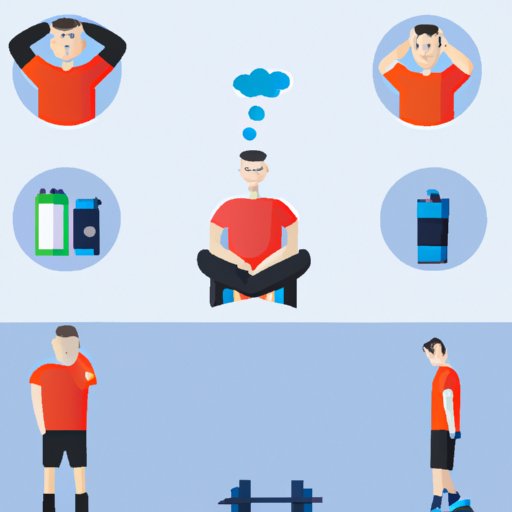Introduction
Feeling tired after a workout is a common experience for many people. While it can be a sign that you’ve been pushing yourself too hard, there are also other factors that can contribute to post-exercise fatigue. In this article, we will explore some of the possible causes of why you may be feeling so tired after a workout.
Analyzing the Physical Demands of Exercise
When it comes to understanding why you are feeling so tired after a workout, it is important to consider the type and intensity of the exercise that you are doing. High intensity exercises such as running and weightlifting require more energy and can leave you feeling more exhausted than low intensity exercises such as walking or yoga.
It is also important to think about how long you are exercising for. Longer duration workouts can cause more fatigue than shorter ones, so it is important to adjust the duration of your workouts to make sure they are appropriate for your level of fitness. Finally, it is important to pay attention to your body and listen to what it is telling you. If you are feeling overly fatigued after a workout, it may be a sign that you need to take a break or reduce the intensity of your workouts.

Exploring the Relationship between Exercise and Sleep
Getting enough sleep is an important part of maintaining good energy levels, both during and after a workout. Studies have shown that people who get less than seven hours of sleep per night tend to have lower energy levels during the day. Poor sleep quality can also affect your performance during a workout, making it harder to push yourself and leading to greater fatigue afterwards.
If you are having trouble sleeping, there are steps you can take to improve your sleep quality. These include avoiding caffeine and alcohol late in the day, sticking to a consistent sleep schedule, and limiting screen time before bed. Additionally, engaging in calming activities such as reading or taking a hot bath can help you relax and fall asleep more easily.
Examining the Effects of Stress on Energy Levels
Stress can have a major impact on your energy levels, both during and after a workout. When you are under stress, your body releases hormones such as cortisol and adrenaline which can lead to increased fatigue. Additionally, chronic stress can lead to poor sleep quality and difficulty concentrating, both of which can make it harder to perform at your best during a workout.
There are several ways to reduce stress levels and boost energy. Regular exercise can help with stress management, as can activities such as yoga and meditation. Additionally, it is important to make sure you are taking breaks throughout the day and engaging in activities that you enjoy. Finally, talking to a mental health professional can be beneficial if you are struggling with stress.
Investigating Nutrition and Hydration Habits
Your diet can have a major impact on your energy levels both during and after a workout. Eating a balanced diet that includes plenty of fruits, vegetables, and lean proteins can help you stay energized during a workout. Additionally, it is important to stay hydrated and avoid sugary drinks which can lead to a crash in energy levels.
It is also important to know when to eat before a workout. Eating too close to a workout can lead to digestive issues and can make you feel sluggish, while eating too far away can lead to low blood sugar and fatigue. Aim to eat a meal or snack 1-2 hours before a workout to give your body enough time to digest.

Considering Overtraining as a Possible Cause
Overtraining syndrome is a condition where an athlete is pushing themselves too hard and not allowing enough time for rest and recovery. This can lead to decreased performance, increased fatigue, and even injury. If you are feeling excessively tired after workouts, it is important to evaluate whether you are pushing yourself too hard and take steps to prevent overtraining.
Signs of overtraining include persistent fatigue, decreased performance, insomnia, and changes in mood. To prevent overtraining, it is important to vary your workouts and allow for adequate rest days. Additionally, it is important to pay attention to your body and stop exercising if you start to feel overly fatigued.

Looking at Mental and Emotional Reasons for Feeling Tired After Working Out
Finally, it is important to consider the mental and emotional aspects of feeling tired after a workout. Anxiety, depression, and other mental health issues can cause fatigue and make it difficult to find the motivation to exercise. Additionally, negative self-talk can make it harder to push yourself during a workout and can lead to feelings of exhaustion afterwards.
If you are dealing with mental health issues, it is important to seek help from a professional. Additionally, it can be helpful to practice positive self-talk and focus on the benefits of exercise rather than the negatives. Finally, it is important to remember that progress takes time, and to be patient and kind to yourself as you work towards your goals.
Conclusion
In conclusion, feeling tired after a workout is a common experience for many people. There are several potential causes for post-exercise fatigue, including the physical demands of exercise, the relationship between exercise and sleep, the effects of stress on energy levels, nutrition and hydration habits, overtraining, and mental and emotional reasons. To combat fatigue, it is important to adjust the intensity and duration of your workouts, get enough sleep, manage stress levels, maintain a healthy diet, and be mindful of your mental health.
(Note: Is this article not meeting your expectations? Do you have knowledge or insights to share? Unlock new opportunities and expand your reach by joining our authors team. Click Registration to join us and share your expertise with our readers.)
